#ngo in gujarat
Text
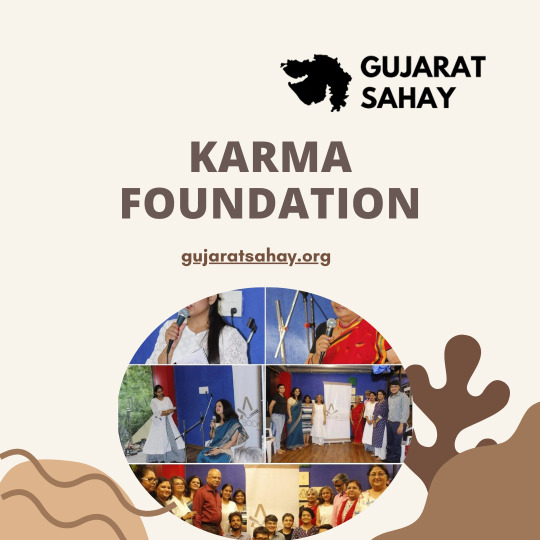
karma foundation
Karma Foundation – a beacon of positive change. Join us in fostering social responsibility, sustainable initiatives, and community empowerment. Discover meaningful ways to contribute to a brighter future. Together, let's create a world where kindness and compassion shape our collective destiny. Explore the transformative journey with Karma Foundation today.
0 notes
Text
Tara Foundation - Best Child Donation Organisation in Ahmedabad, Gujarat
Tara Foundation is best child donation organization in Ahmedabad, Gujarat as well child sponsor organizations, child hearing problem donor contact, child speech problem foundation trust Gujarat, speech therapy foundation for charity, hearing aid helping for child organization.

Google Map:--> https://maps.app.goo.gl/jvkvjKymJMsUg95D6
Ear loss child donation foundation in Ahmedabad, child care NGO in Ahmedabad, best NGO in Ahmedabad, best NGO in Gujarat, NGO in Ahmedabad for child education, child foundation in Ahmedabad, child foundation in Gujarat
#Ear loss child donation foundation in Ahmedabad#child care NGO in Ahmedabad#best NGO in Ahmedabad#best NGO in Gujarat#NGO in Ahmedabad for child education#child foundation in Ahmedabad#child foundation in Gujarat
0 notes
Text
0 notes
Text
Quote of the day -SGCCI
Good_day
When time is not going well, that time keep the patience and do whatever you are doing and finds good ways also for better success.
जब समय ठीक नहीं चल रहा हो तो उस समय धैर्य बनाए रखें और जो भी कर रहे हैं उसे करें और बेहतर सफलता के लिए अच्छे रास्ते भी ढूंढे।
know more about SGCCI: https://sgcci.in or call: 72111 73118

#SGCCI_NonProfit_organization#business#surat#india#chamber#ngo#SGCC_Non Governmental Trade Association#Find Event in Surat SGCCI#Become member of SGCCI#Are you doing business in the South Gujarat region?#are you doing textile business in surat and want to expand business globally ?#are you doing export and import business in surat if yes then join sgcci
0 notes
Text
Over the past two decades, thanks to Narendra Modi, Hindu nationalism has been coupled with a form of national-populism that has ensured its success at the polls, first in Gujarat and then in India at large. Modi managed to seduce a substantial number of citizens by promising them development and polarizing the electorate along ethno-religious lines. Both facets of this national-populism found expression in a highly personalized political style as Modi related directly to the voters through all kinds of channels of communication in order to saturate the public space.
Drawing on original interviews conducted across India, Christophe Jaffrelot shows how Modi’s government has moved India toward a new form of democracy, an ethnic democracy that equates the majoritarian community with the nation and relegates Muslims and Christians to second-class citizens who are harassed by vigilante groups. He discusses how the promotion of Hindu nationalism has resulted in attacks against secularists, intellectuals, universities, and NGOs. Jaffrelot explains how the political system of India has acquired authoritarian features for other reasons, too. Eager to govern not only in New Delhi, but also in the states, the government has centralized power at the expense of federalism and undermined institutions that were part of the checks and balances, including India’s Supreme Court.
Modi’s India is a sobering account of how a once-vibrant democracy can go wrong when a government backed by popular consent suppresses dissent while growing increasingly intolerant of ethnic and religious minorities.
6 notes
·
View notes
Text
Anti-India bias of the BBC
BBC's recent 2 part documentary, India, the Modi question, on PM Modi is very divisive and has a strong anti-India, anti-Hindu bias. (January 2023)
Instead of focusing on the life or achievements of the Prime Minister of the largest democracy in the world, BBC focused on the controversial riots that happened at the beginning of his career as the Chief Minister (CM) of Gujarat state in India.
On the morning of 27th February 2002, a mob of muslim rioters from Godhra, Gujarat, burned a train, killing 59 Hindu pilgrims (9 men, 25 women and 25 children). A state wide strike on the 28th Feb sparked riots across Gujarat. Army was called in and arrived on the 1st of March. Despite that, violence lasted for weeks, resulting in the death of over 2000 people, of which, 75% are presumed to be muslim.
The main claim of people accusing PM Modi of post-Godhra riots is that he waited 3 days before calling in the army, allowing rioters to kill muslims with impunity.
Sloppy journalists assumed 28th till 1st March was a delay of 3 days. Intelligent ones knew that Feb 2002 had 28 days! So the 1st was the very next day of the month and there was no delay of 3 days! Indian army was there the very next day of the riots, not 3 days late! I wish the BBC had checked facts rather than rely on hear-say before making grave allegations of genocide on the PM Modi!
BBC's prog on India's PM Modi shows its obvious bias and absolute colonial arrogance! It assumes it knows more than the police, investigating agencies and the High Court (HC) of India! Every court in India, from its HC in the state of Gujarat to the Supreme Court (SC) in the centre, investigated Mr Modi for over a decade. They went through a mountain of data, investigating every claim made by every NGO and journalist to try and see if Mr Modi was complicit in the Gujarat riots of 2002. This is when the Congress party was in power and being opposed to CM Modi's BJP party, they used every lever of gov to try and nail Mr Modi. Yet at every turn, evidence showed that Mr Modi did his best to quell the riots, including calling in the army on the very day the riots started and they arrived the very next day!
No less than the SC of India exonerated Mr Modi on all counts of all charges levelled at him. Yet, 20 years after the event, BBC continues to rack up old, unfounded allegations and continues to malign the PM of India.
BBC has strongly insinuated in the documentary that CM Modi was voted as the PM Modi because of his anti-Muslim views. It totally ignored the fact that the nation voted him in for his 'development' model, which was explicitly agnostic of voters' religious affiliations. His party's slogan is 'Sab ka saath, sab ka vikas', ie With everyone and progress for everyone’. People across India voted him to be their Prime Ministership because of the progress and development they saw in Gujarat during his 12 year tenure as its chief minister. BBC also ignores that PM Modi has been voted back to power for a 2nd term because of the positive growth people have seen progress seen across India in his 1st term.
Last week, BBC spent the best part of the hour exploring what Mr Modi did or did not do after the riot. But, crucially, it spent no time exploring the cause of the riots - the cold blooded murder of 59 Hindu pilgrims by a muslim mob who burned them alive! Why were the lives of Hindus victims so easily disregarded by the BBC? BBC spent a lot of time talking to the muslim victims of the riots. Why did the BBC not speak to the family of the Hindu victims? Why did it not speak to the muslim extremists who murdered Hindu pilgrims? Why did it not spend any time examining the 31 people found guilty by the court system of the heinous murder of Hindu pilgrims, and instead waste time examining the 1 person exonerated of any guilt!
BBC's series on PM Modi will do nothing to rehabilitate its image as a racist, left-wing organisation that produces biased programmes that are not fair or balanced in their content or views.
12 notes
·
View notes
Text
donation money to charity in Delhi
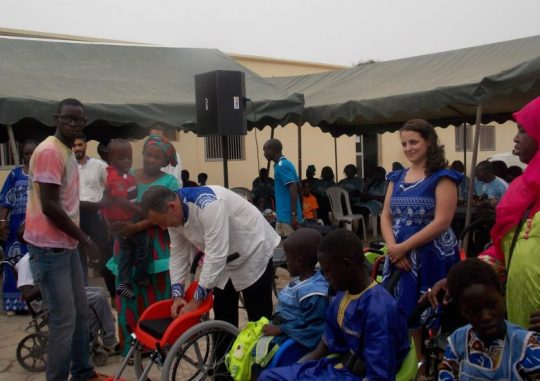
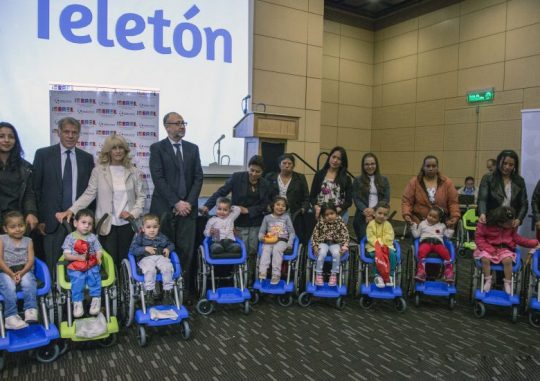
Wheelchair of hope is available in many cities like mumbai, gujarat, delhi, bangalore, noida and mumbai The plan was launched in 2015.
The main aim of the wheelchair of hope is to make sure that the mobility of children is accessible to those who are in need of a wheelchair and they are able to walk in the same way. Many children's medical care is focused on making wheelchairs, which are not only functional, but are designed to light up children with colorful and bright colors.
The wheelchair of hope is visible on the face:
1. Affordability: Striving to produce cost-effective wheelchairs for children and families in need.
2. Design and Comfort: Hope Wheelchair aims to provide millions of children with wheelchairs that are not only functional but also comfortable and look good.
3. Global Reach: The organization is working in different cities of India like Mumbai, Gujarat, Delhi, Bangalore, Noida and most of the work is being done in cities and wheelchairs are being distributed to needy children and NGOs. NGOs are helping.
4. Community Involvement: Wheelchairs of Hope involve the community in the distribution process and volunteers to ensure that wheelchairs reach those who need them most.
5. Impact Measurement: The organization regularly evaluates the impact of its services on the lives of children, and ensures that the services provided can improve the impact of wheelchairs.
Wheelchair of hope is provided to disabled children. We believe that every child deserves the chance to participate in society without the effects of their shared characteristics.
Wheelchair of hope can be donated across cities in India. As per my knowledge the wheel of hope has not been able to operate in any city of India. Some examples in this business may include:
New Delhi
Mumbai
Bangalore
Chennai
Gujarat
Hyderabad
The information in the Yeh City reference is subject to change, so you are advised to check the Wheelchairs of Hope website or a relevant source for the latest information.
2 notes
·
View notes
Text
Embracing Solar Power in Ahmedabad: A Bright Future Ahead
Introduction
Ahmedabad, the vibrant and bustling city in Gujarat, is known for its rich cultural heritage and rapid economic growth. As the city continues to expand, the demand for sustainable and reliable energy sources has never been higher. Solar power, with its immense potential and environmental benefits, is becoming an increasingly popular choice for both residential and commercial purposes in Ahmedabad.
Why Solar Power?
Abundant Sunshine: Ahmedabad enjoys a significant amount of sunshine throughout the year, making it an ideal location for harnessing solar energy in Ahmedabad. With over 300 sunny days annually, the city provides a perfect environment for solar panels to operate at maximum efficiency.
Cost Savings: Investing in solar power can lead to substantial savings on electricity bills. Once the initial installation costs are recovered, typically within a few years, solar energy becomes virtually free, protecting consumers from rising electricity costs.
Environmental Impact: Solar power is a clean and renewable source of energy. By switching to solar, Ahmedabad residents can significantly reduce their carbon footprint, contributing to a healthier environment and combating climate change.
Energy Independence: Solar energy provides a degree of energy independence. Homeowners and businesses can generate their own electricity, reducing their reliance on the grid and ensuring a more stable and secure energy supply.
The Solar Landscape in Ahmedabad
Ahmedabad has seen a surge in the adoption of solar power in recent years, driven by government incentives, falling costs of solar technology, and growing environmental awareness among residents.
Government Initiatives: The Gujarat government has been proactive in promoting solar energy through various schemes and subsidies. Programs like the Surya Urja Rooftop Yojana offer financial assistance to install solar panels, making it more affordable for homeowners and businesses.
Innovative Projects: Ahmedabad is home to several pioneering solar projects, such as the solar rooftop initiative by the Ahmedabad Municipal Corporation (AMC). These projects showcase the city’s commitment to embracing renewable energy and serve as models for other cities to follow.
Community Engagement: Various NGOs and community groups in Ahmedabad are actively involved in raising awareness about the benefits of solar power. Workshops, seminars, and awareness campaigns are helping to educate the public and encourage the adoption of solar technology.
Choosing the Right Solar Company
When it comes to installing solar panels, choosing the right solar company is crucial. Here are some factors to consider:
Experience and Expertise: Look for a company with a proven track record and extensive experience in the solar industry. Expertise in local conditions and regulations can make a significant difference in the efficiency and longevity of your solar system.
Quality of Products: Ensure that the company uses high-quality solar panels and equipment. Reliable and durable products can withstand Ahmedabad’s climate and provide better performance over the years.
Customer Service: A company with excellent customer service can provide better support throughout the installation process and beyond. Look for reviews and testimonials from previous customers to gauge the company’s reputation.
Warranty and Maintenance: Check the warranties offered on the solar panels and other components. A good warranty and regular maintenance services can ensure your solar system remains efficient and trouble-free for a long time.
Conclusion
The future of energy in Ahmedabad is bright, and solar power is at the forefront of this transformation. By leveraging the city’s abundant sunshine and the growing support from government and community initiatives, Ahmedabad can lead the way in sustainable energy solutions. Whether you’re a homeowner looking to reduce your electricity bills or a business aiming to enhance your green credentials, now is the perfect time to explore the benefits of solar power.
Investing in solar energy not only makes economic sense but also contributes to a cleaner, greener future for Ahmedabad. Join the solar revolution today and be part of a sustainable tomorrow.
0 notes
Text
Illuminating the Paths of Education: The Vision of Poonamben Madaam

In the dynamic landscape of Indian politics, where voices clamor for attention, Poonamben Madaam emerges as a beacon of optimism and progress. As a member of parliament from Gujarat, she has dedicated herself to the noble cause of educating women and children, recognizing the transformative power it holds for society. Born and raised in Gujarat, Poonamben Madaam grasped the intrinsic value of education from an early age. She discerned that education, beyond the dissemination of knowledge, serves as a potent instrument for societal and economic upliftment, particularly for women and children. With this conviction, she embarked on a mission to ensure equitable access to quality education for all, irrespective of their circumstances.
Poonamben Madaam's endeavors in the realm of women and child education are comprehensive. Central to her efforts is the enhancement of school infrastructure and facilities, particularly in rural and underserved areas. Understanding the pivotal role of conducive learning environments in academic success, she fervently advocates for the establishment of new schools, the refurbishment of existing ones, and the provision of essential amenities like clean water, sanitation facilities, and libraries.
Furthermore, Poonamben Madaam champions the cause of girls' education with unwavering determination. She firmly believes that educating girls not only transforms their lives but also catalyzes positive changes in families, communities, and the nation at large. To this end, she has spearheaded various initiatives aimed at encouraging parental support for their daughters' education, offering scholarships and incentives to female students, and implementing measures to ensure their safety and well-being.
In addition to addressing infrastructure and accessibility, Poonamben Madaam is deeply committed to enhancing the quality of education imparted to children. Recognizing that education encompasses more than mere memorization, she advocates for educational reforms that foster critical thinking, creativity, and holistic development. Her advocacy extends to promoting experiential learning, digital literacy, and vocational training, equipping children with the skills necessary to thrive in an ever-evolving world.
Moreover, Poonamben Madaam underscores the significance of community engagement in driving educational progress. She collaborates actively with local leaders, educators, NGOs, and grassroots organizations to identify challenges, devise solutions, and implement initiatives tailored to the unique needs of each community. By fostering partnerships and leveraging resources, she amplifies the impact of her endeavors, ensuring sustainable advancement in the field of education.
Beyond her legislative responsibilities, Poonamben Madaam actively engages in outreach programs, awareness campaigns, and educational workshops, directly interacting with students, parents, and educators to foster a culture of learning and empowerment. Her relentless advocacy and hands-on approach have garnered widespread admiration and respect, both within her constituency and beyond.
In summary, Poonamben Madaam's exemplary leadership in the domain of women and child education epitomizes her steadfast commitment to social justice and inclusive development. Through her transformative initiatives and unwavering advocacy, she not only shapes minds but also molds the future of generations to come. As India progresses on its path towards prosperity, Poonamben Madaam remains a beacon of hope, inspiring change and leaving an indelible mark on countless lives.
#bhartiya janta party#the bjp#bhajpa#bjp#chunav result#bjp flag#chunav#indian political parties#political party#bjp candidate list#bjp party#bjp s
0 notes
Text
Explore meaningful volunteer opportunities in Ahmedabad with our curated list of 5 top NGOs. Make a positive impact on society by joining hands with these reputable organizations committed to community development, education, healthcare, and more. Discover how you can contribute to transformative initiatives with these NGOs for a fulfilling and impactful volunteering experience.
#ngo in ahmedabad#charitable trust in ahmedabad#best ngo in ahmedabad#best ngo in gujarat#ngo in gujarat
0 notes
Text
International Women's Day
March 8, 2024
Women Achievers Award
Sponsored by: The National UN Volunteers-India
Smt Bhavneet Kaur, Principal, Shree Satya Sai Vidyalaya CBSE, Jamnagar, Gujarat
Service to the field of education
30 years from Rural to Urban Sector.
Dr. Bhavneet Kaur, a seasoned educator with three decades of experience, holds an M.A. in English Literature. Her remarkable contributions to education have earned her two honorary doctorates. Currently serving as the Principal of Shree Satya Sai Vidyalaya's CBSE Section in Jamnagar, she is also the founder of the Akal Academy of Arts and Artists.
Dr. Kaur is dedicated to societal development, exemplified through her NGO, Mishika, focusing on the welfare of children and women. Additionally, she serves as a CBSE Resource Person, showcasing her commitment to enhancing educational practices on a broader scale.
Dr. Bhavneet Kaur embodies excellence and passion in her multifaceted educational endeavors.

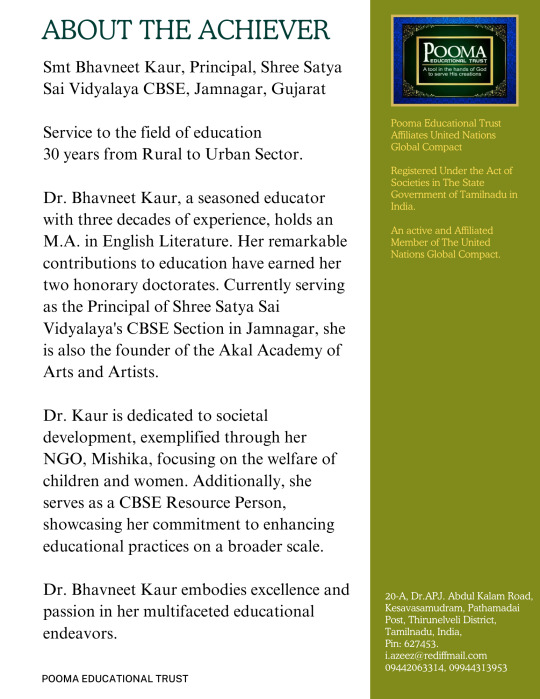

0 notes
Text
Over the past two decades, thanks to Narendra Modi, Hindu nationalism has been coupled with a form of national-populism that has ensured its success at the polls, first in Gujarat and then in India at large. Modi managed to seduce a substantial number of citizens by promising them development and polarizing the electorate along ethno-religious lines. Both facets of this national-populism found expression in a highly personalized political style as Modi related directly to the voters through all kinds of channels of communication in order to saturate the public space.
Drawing on original interviews conducted across India, Christophe Jaffrelot shows how Modi’s government has moved India toward a new form of democracy, an ethnic democracy that equates the majoritarian community with the nation and relegates Muslims and Christians to second-class citizens who are harassed by vigilante groups. He discusses how the promotion of Hindu nationalism has resulted in attacks against secularists, intellectuals, universities, and NGOs. Jaffrelot explains how the political system of India has acquired authoritarian features for other reasons, too. Eager to govern not only in New Delhi, but also in the states, the government has centralized power at the expense of federalism and undermined institutions that were part of the checks and balances, including India’s Supreme Court.
Modi’s India is a sobering account of how a once-vibrant democracy can go wrong when a government backed by popular consent suppresses dissent while growing increasingly intolerant of ethnic and religious minorities.
8 notes
·
View notes
Text
Agriculture NGO In Rajasthan: Traditional Methods Of Preservation Of Kharif Seeds At Family and Community Level
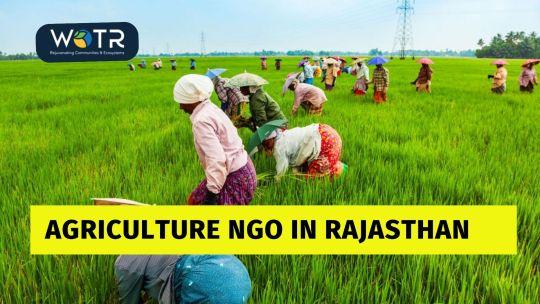
Agriculture and animal husbandry are the main sources of income for farmers, particularly tribal farmers in Rajasthan, Madhya Pradesh, and Gujarat. As the basis of agriculture, seeds represent a priceless legacy from nature. For millennia, our predecessors have painstakingly worked to refine and cultivate consumables like cereals, fruits, tubers, and so forth. The farming, agricultural, and animal husbandry cultures were born out of their labours. Agriculture NGO in Rajasthan acknowledging the significance of superior seeds has led to the creation of techniques for identifying them and storing them safely all year round. Our tribal group has been conserving seeds for years, and it has become an essential aspect of our culture.
The ability to recognise and preserve seeds is inherited and continues to be practiced even in the face of increasing commercial pressures. The idea of Beej Swaraj is the result of the community's ongoing efforts to conserve its ancient knowledge. Our tribal farmers in the area have maintained hundreds of seed kinds, and this is their tradition. They have devised a variety of methods for reliably preserving seeds in addition to saving seeds of all sorts. But the tendency of adopting hybrid seeds started because of the market's growing power. Expenses for other inputs like pesticides, chemical fertilisers, and irrigation also went up at the same time.
This led to the contamination of the fields' soil and water and the entanglement of farmers in a web of debt due to their avarice. Under such circumstances, native seeds that are abundant in regional traits must be preserved. We can begin this task immediately, now. All of us have just harvested summer crops, including millet, finger millet, barnyard millet, tiny millet, foxtail millet, corn, lentils, rice, pigeon pea, peanuts, sesame and others. Once the crops have been harvested and threshed, we may grade the resulting seeds. We may use a variety of techniques to gather and store seeds if we choose seeds that are consistent in size, kind, and colour and free of pests and illnesses.
Kabla: At the Agriculture NGO in Rajasthan traditionally, traditional seed storage containers known as "kabla" are constructed from bamboo or other types of wood. After that, a combination of clay and cow dung is applied to these kablas. Following their sun-drying process, these kablas are used to store seeds, including wheat, corn and rice. Before being stored, neem leaves are laid out at the base of the kabla, and seeds are arranged sporadically, separated by neem leaves. Until the kabla is full, this process is repeated. The top layer is then covered with neem leaves, sagwan or coconut leaves, and, lastly, a combination of clay and cow dung is used to seal it before packaging.
Pulses: Pulses of all kinds, including urad, moong, chana, toor, jhala, tilhan, and other seeds that need less moisture than grains, are stored in pots of varying sizes. With the help of Agriculture NGO in Rajasthan the seeds are sun-dried to remove any moisture and bugs before being planted in the pots. Before combining them with ash and filling the pots, conserved seeds are additionally sun-dried. Before packing, a combination of cow dung and clay is used to seal the top portion of the pot. Remove the top layer and take the seeds when it's time to sow or when seeds are needed. The seeds are thus shielded for two to three days.
Hanging Whole Fruits: Certain vegetables, such bottle, ridge, and sponge gourds, may be preserved securely in their mature fruits. Using this technique, a ripe bottle gourd is dried, its seeds are taken out, and it is hollowed out. It is then filled with additional vegetable seeds, covered with a cloth-sealed lid, and treated with a cow dung and urine combination. This aids in the seeds' safety.
To save the seeds of fruits and vegetables (e.g., maize, beans, eggplant), tie them into a bundle and hang them somewhere that will keep them dry and exposed to air and sunshine.
The best way to preserve onion and garlic seeds is to knot them into bundles and hang them in a dark, well-ventilated area.
Similarly, seeds may be preserved by using castor and mustard oil. To do this, oil is added to the seeds and stirred until the seeds lose their ability to glow.
In a field corner, a pit is dug to store seeds such as ginger, turmeric, arbi (colocasia), musli, etc. After planting seeds, the hole is filled with leaves and grass.
Seed Attachment to Teak or Bamboo Leaves: The seeds are adhered to the leaves of teak or bamboo trees for fruits that have a slimy texture, such as cucumbers, tomatoes, and the like. Next, a high location is used to hang these leaves. To extract seeds for planting, the leaves are massaged in preparation for the next season's seed requirements. By doing this, the seeds are guaranteed safe.
In the end, Agriculture NGO in Rajasthan like WOTR having pure native seeds easily accessible at home is possible by using these techniques. This method makes seed management more self-sufficient by preventing pests of any type from entering the seeds and eliminating the need to buy seeds from the market.
0 notes
Text
In the heart of Rajkot, Gujarat, the dynamic duo of Rakesh Rajdev and Rupal Rajdev have been quietly making significant strides in the realm of social service through their NGO.
0 notes
Text
In the vibrant city of Rajkot, Gujarat, Rakesh Rajdev and Rupalben Rajdev have become synonymous with transformative social change through their dedicated work with an NGO.
0 notes
Text

Vadodara: A Hub for Social Welfare NGOs
Registered NGO in Vadodara is a term that refers to the non-governmental organizations that are legally registered and operate in the city of Vadodara, Gujarat. These NGOs work for various social causes and issues, such as education, health, environment, women empowerment, child welfare, rural development and more.
#Registered NGO In Vadodara#Corporate Charity Vadodara#Donation To NGO Baroda#Donation Organizations In Vadodara#Best NGO In Vadodara#Corporate Donations In Vadodara
0 notes